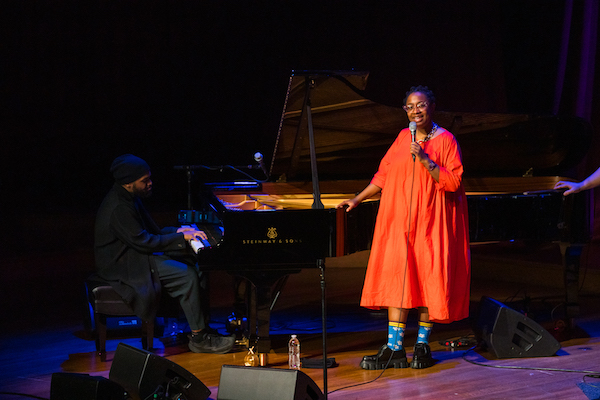Concert Review: Jazz Vocalist Cécile McLorin Salvant — Falling in Love Again
By Jon Garelick
Once again, here was the shock in Cécile McLorin Savant’s subversive conceptual daring.
Cécile McLorin Salvant at Sanders Theatre, Cambridge, on February 2. Presented by Celebrity Series of Boston

Cécile McLorin Salvant with pianist Sullivan Fortner at Sanders Theatre. Photo: Robert Torres/Celebrity Series of Boston
After the first couple of songs in Cécile McLorin Salvant’s show at Sanders Theatre on Feb. 2, I was beginning to wonder: Was I falling out of love with this remarkable musician? Everything was in place as I remembered it: the uncanny control and interpretive insight, the gorgeous unforced power of that beautiful voice, the insight she gave to those interpretations with a shift in register, jumping up or down an octave, squeezing a note on a vowel so it came out like a half-valved effect on a trumpet. Her tempos, her tact, her taste.
And her humor. Those first couple of tunes — Rodgers and Hammerstein’s “Stepsisters’ Lament,” from Cinderella, and Burt Bacharach and Hal David’s “(Always) Something There to Remind Me” — gave her plenty of opportunity to show off her musical theater flair for irony and gimlet-eyed sarcasm. (“She’s a frothy little bubble/With a flimsy kind of charm,/And with very little trouble/I could break her little arm!”)
Maybe I was just being a brat (what Salvant said her own older sister called her: “a lucky brat”). The sound was fine, the seat was great. I’d seen Salvant at least half a dozen times, in all manner of venues. First at the Regattabar and then at the Newport Jazz Festival, and the New Orleans Jazz and Heritage Festival with a trio, and then a few times each in duo shows with pianist Sullivan Fortner at Scullers and elsewhere. For every show I was absolutely transfixed, no matter whether the venue was a club or a tent. Mid-set in New Orleans I turned to the friend next to me and said, “She does what she does as well as I’ve seen anyone do anything.”
I recall only one show where Salvant didn’t absolutely blow me away — a Celebrity Series show (as was this one) at Jordan Hall – her first big-venue gig in town. And I never quite figured out what the problem was. Was the pacing off? One too many longish piano solos from the otherwise impeccable Fortner? At Sanders I thought maybe it was that I’ve heard her do these songs before, so there was no longer the pleasant shock of unusual material presented in a newly revealing way.
But then Salvant started singing “Alfie” — another Bacharach/David, one of the most worn of worn ’60s standards. It started with just piano and voice (was the Sanders piano sounding a little brittle?). But as the band came in (bassist Yasushi Nakamura and drummer Savannah Harris, both brilliant all night), Salvant began to reveal the drama in the lyric — lines I’d never listened to before. After all, who really knows the song beyond the familiar rise of that opening line, a lyric that was a meme before there were memes.
“Are we meant to take more than we give,” Salvant sang, “Or are we meant to be kind? And if only fools are kind, Alfie/Then I guess it is wise to be cruel.” Kindness and cruelty, the simple binary. The song opened up and became deeper, the music soaring. “And if life belongs only to the strong, Alfie/What will you lend on an old golden rule?” The weak and the strong. By the finale, the song had become epic.

Cécile McLorin Salvant with pianist Sullivan Fortner at Sanders Theatre. Photo: Robert Torres/Celebrity Series of Boston
She followed that with another Bachrach/David, “Wives and Lovers,” which I’ve also heard her do before. A woman friend of mine couldn’t believe it when I told her that Salvant gave it a feminist slant. “That’s the worst song ever!” my friend said. (She has since become a Salvant believer.) This, after all, is the Black woman singer who first grabbed my attention by reviving “(You Bring Out) The Savage in Me” (by ’30s trumpeter/singer Valaida Snow) and “Nobody,” by the famous vaudevillian Bert Williams (a Black man who performed in blackface and was immortalized in a loving portrait by Duke Ellington).
Here again was the shock in Savant’s subversive conceptual daring. She followed “Wives and Lovers” with “Barbara Song,” one of the less performed numbers from Brecht and Weill’s Threepenny Opera. Another acid-dipped portrayal of female masochistic defiance. There was “I Believe in You,” from How to Succeed in Business Without Really Trying (about her own social anxiety, Salvant said).
She followed with “Il m’a vue nue” (translated from the stage, “He Saw Me Naked”) from her latest CD, Mélusine, a cycle based on a folktale about a half-woman/half-snake, told in four languages. Sting’s “Until” featured both Sullivan and Harris to good effect, with the line “you’re so close to a mystery” on the out-chorus repeated like an incantation. She joined her own “Fog” (the singer lost in love, afraid to fall, holding the note on that word) with another original, “Left Over,” from the same album, For One to Love. “One Step Ahead” (previously recorded by Aretha Franklin, before Salvant’s own version on her album The Window) played with rhythm as implied in the title, and when Nakamura took his bass solo he began with a slide up the strings that mimicked Salvant’s vocal slides, to her visible approval.
But the best was yet to come. For an encore, Salvant began improvising a cappella on what sounded like a Middle Eastern minor mode, and then a melody began to emerge, and the lyric, “How could you leave me when I needed to possess you?” Could it be? “Heathcliff, it’s me, I’m Cathy, I’ve come home. I’m so cold, let me into your window.”
Kate Bush’s “Wuthering Heights,” a song owing as much to Laurence Olivier and Merle Oberon as to Emily Brontë. Salvant tipped her head back and let the note rise to the Sanders ceiling, and then segued to “Breathing,” Bush’s self-described “little symphony,” about a devastated earth, Salvant bringing the dynamic and tempo way down, Harris supplying exquisite soft-brushed cymbal triplets. “Breathing in … breathing out,” Salvant sang as the song ended, again a cappella, repeating the line, soft and softer, “in” … “out” … “in” … “out.”
Cécile McLorin Salvant was back. Or, more rightly, I was.
Jon Garelick can be reached at garelickjon@gmail.com.
